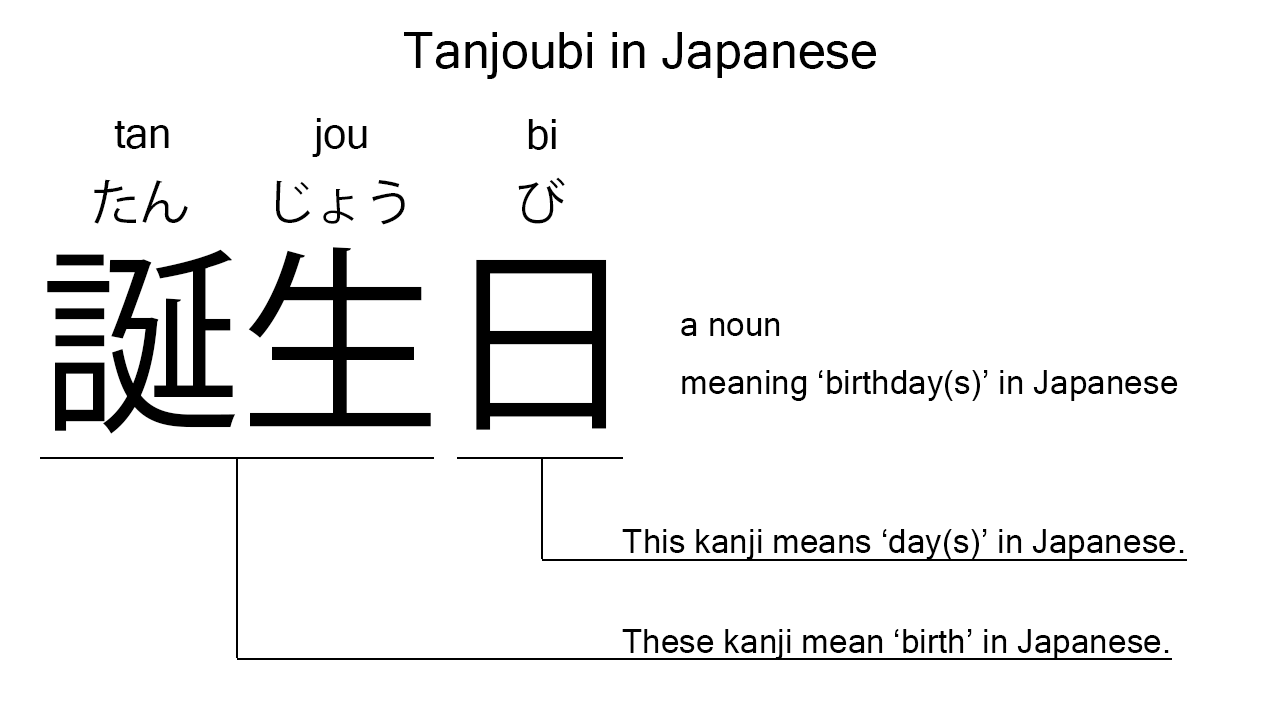What does “tanjoubi” mean in Japanese?
Native speakers use tanjoubi to mean a ‘birthday’ in Japanese. Perhaps, some Japanese learners know this word as it is sometimes used in Japanese movies, songs, novels, manga, anime, and the like. In this blog post, however, I will explain this word in detail based on its kanji expression. And also, I will explain how to use it through example sentences. My explanations would help Japanese learners understand tanjoubi more clearly. Then, let’s gets started!
Contents
Definition and meaning of “tanjoubi”
Let me start with the definition and meaning of tanjoubi.
- tanjoubi – 誕生日 (たんじょうび) : a noun meaning a ‘birthday’ in Japanese. This can also work as plural. Learn more about Japanese plural.
The definition and meaning are very simple and clear. To understand this noun more clearly, however, let me explain its kanji expression in detail.
Tanjoubi in kanji
The kanji expression of tanjoubi consists of the following two parts:
- tanjou – 誕生 (たんじょう) : a noun meaning a ‘birth’, ‘origin’, or ‘creation’ in Japanese.
- bi – 日 (び) : a noun meaning a ‘day’ in Japanese. Normally, this works as a suffix to add the meaning of a ‘day’ to its preceding word.
From these two parts, we can understand that tanjoubi literally means a ‘birth day’ in Japanese. This literal interpretation is completely in line with the actual meaning.

When we meet new kanji expressions, we should check their kanji characters in detail to understand their meanings clearly and deeply. In many cases, kanji characters tell us a lot about the meanings of the expressions they form. Actually, here, we could get the better understanding of tanjoubi through the detailed check above.
So far, I’ve explained the definition and meaning of tanjoubi together with its kanji characters. Then, let me explain how to use it through the example sentences below.
How to say “birthday” in Japanese
ashita wa watashi no tanjoubi desu – 明日は私の誕生日です (あしたはわたしのたんじょうびです)
Tomorrow is my birthday.
Below are the new words used in the example sentence.
- ashita – 明日 (あした) : a noun meaning ‘tomorrow’ in Japanese.
- wa – は : a binding particle working as a case marker or topic marker. In the example, this works after ashita to make the subject in the sentence.
- watashi – 私 (わたし) : a pronoun meaning ‘I’ in Japanese.
- no – の : a case particle used after a noun or pronoun to make its possessive case. In the example, this is used after watashi to make its possessive case, watashi no, which means ‘my’ in Japanese.
- desu – です : an auxiliary verb used after a noun or adjective to make it polite. Probably, this is well known as a part of Japanese desu form. In the example, this is used after tanjoubi to make it sound polite.
This is a typical usage of tanjoubi. In this example, it works together with watashi and no to mean ‘my birthday’ in Japanese.
Another example of “tanjoubi”
「tanjoubi wo tanoshimi masu」 to kanojo ga it ta – 「誕生日を楽しみます」と彼女が言った (「たんじょうびをたのしみます」とかのじょがいった)
“I will enjoy my birthday,” she said.
Below are the new words used in the example sentence.
- wo – を : a case particle used to make the object word in a sentence. In the example, this is used after tanjoubi to make the object in the clause.
- tanoshimi – 楽しみ (たのしみ) : one conjugation of the verb, tanoshimu, which means ‘to enjoy’ in Japanese. In the example, it has been conjugated for the better connection with its following word.
- masu – ます : an auxiliary verb used after a verb to make it polite. Probably, this is well known as a part of Japanese masu form. In the example, this is used after tanoshimi to make it sound polite.
- to – と : a case particle working as a quote marker. In the example, this works after the clause to indicate what she said.
- kanojo – 彼女 (かのじょ) : a pronoun meaning ‘she’ in Japanese.
- ga – が : a case particle used to make the subject word or the object word in a sentence. In the example, this is used after kanojo to make the subject in the sentence.
- it – 言っ (いっ) : one conjugation of the verb, iu, which means ‘to say’, ‘to tell’, or such in Japanese. In the example, it has been conjugated for the better connection with its following word.
- ta – た : an auxiliary verb used after a verb, adjective, or auxiliary verb to make its past tense form. Probably, this is well known as a part of Japanese ta form. In the example, this is used after it to make its past tense form, it ta.
This is another example of tanjoubi. In this example, it works together with wo to become the object in the clause. When we want to mean a ‘birthday’ in Japanese, anyway, this noun is always a very good option.
Summary
In this blog post, I’ve explained the definition and meaning of tanjoubi in detail based on its kanji expression. And also, I’ve explained how to use it through the example sentences. Let me summarize them as follows.
- tanjoubi – 誕生日 (たんじょうび) : a noun meaning a ‘birthday’ in Japanese. These three kanji characters literally mean a ‘birth day’ in Japanese. This literal interpretation is completely in line with the actual meaning. When we want to mean a ‘birthday’ in Japanese, this noun is always a very good option.
Hope my explanations are understandable and helpful for Japanese learners.
Leave a Reply